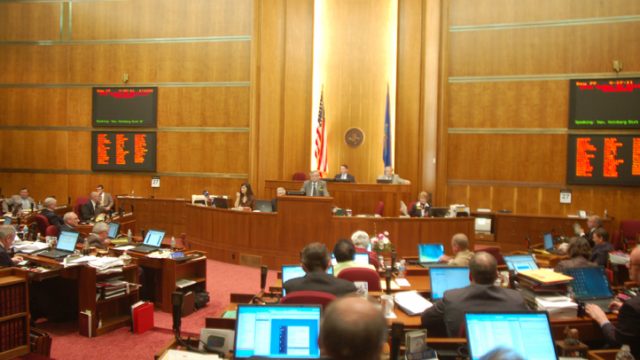64th Legislative Assembly: Week 12 Tue & Wed Highlights- State Sovereignty and Higher Ed Governance

Analysis of Week 12 continues in this post, where we will discuss bill activities for Tuesday, March 24 and Wednesday, March 25. Tuesday and Wednesday are a bit slower after a very busy Monday, at least for our marker bills.
In addition to the bills listed below, the Senate Appropriations Committee hearings will continue for HB 1003 in the Harvest Room. This is the budget for the ND University System. They start at 8:30am each day. We discussed this bill in the post covering the Monday hearings, with our chief concern being keeping intact the House language on removing auditors and lawyers from the system.
Tuesday, March 24
HCRs 3022 and 3033– Regulation Freedom and Rejecting Federal Actions
Senate Judiciary
Fort Lincoln Room
Starts at 9:00am
These two bills take on a common problem with federal government overreach through two different approaches. Each has merit, and each could be effective by themselves or (better yet) together. Both seek to place in the hands of the State Legislature and Congress respectively (as well as the people too in one case) the ability to push back against an out of control federal government.
HCR 3022 would change the State Constitution as follows:
This isn’t a concept without precedent. In 1997, the Supreme Court of the United States found in Mack and Printz v. United States that, while the federal government may pass laws, enact regulations, or sign executive orders; state and local governments have no responsibility to help them enforce these actions (they are not necessarily restricted from doing so, however). There is no supremacy clause issue here. This HCR, if adopted, will simply place in our State Constitution that state and local government will not enforce federal actions if so directed by the representatives of the people of our state — the Legislature — or the people themselves.
[mks_pullquote align=”right” width=”300″ size=”24″ bg_color=”#000000″ txt_color=”#ffffff”]No matter how big the federal government is, they can’t be everywhere in the state and do everything, at least without the assistance of the state and their political subdivisions. Can you imagine how powerful something like this would be if 49 other states adopted it too?[/mks_pullquote]This amendment will strengthen our state sovereignty and promote better separation of powers. No matter how big the federal government is, they can’t be everywhere in the state and do everything, at least without the assistance of the state and their political subdivisions. Can you imagine how powerful something like this would be if 49 other states adopted it too? The federal government might actually have to think hard about the actions they take; I think we can all agree that would be a welcome change.
HCR 3033 will propose a Regulation Freedom Amendment to the US Constitution which could look something like this:
 As you can see, this legislation takes a narrower approach by focusing only on federal regulations. Of course it will need to go through the ratification process, but if adopted such an amendment can go a long ways towards reeling in an executive branch that doesn’t feel a need to work with Congress — like the one we have now.
As you can see, this legislation takes a narrower approach by focusing only on federal regulations. Of course it will need to go through the ratification process, but if adopted such an amendment can go a long ways towards reeling in an executive branch that doesn’t feel a need to work with Congress — like the one we have now.
Wednesday, March 25
HCR 3046- Higher Ed Governance Models Study
Senate Education
Missouri River Room
9:00am
This HCR was recently adopted after the crossover break by the House, as Concurrent Resolutions don’t need to be acted on by the chamber of origination before that break. We wrote about it in the Week 10 analysis; it is an HCR we would like to see both passed and added to the study list for the interim session.
As we said a few weeks back, this study appears to try and work with the existing convoluted Higher Education governance structure in our state (since that system was able to stir up enough false innuendo and fear to defeat Measure 3) to make it more effective, and in turn more accountable. This is a direction we need to take the University System, even if they have to be dragged along by their heels. It will open up for all the world to see the severe shortcomings of governance we currently have, and more importantly, propose ways to fix those problems in law. Such a study is long overdue.





